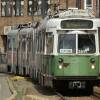Updated at 11:57 a.m. March 10
The MBTA announced Thursday night it was immediately slowing trains across the entire system because of safety concerns. As of Friday morning, most of those restrictions are no longer in place.
Speed limits remain in effect on Green Lines and the Mattapan Trolley, with trains not exceeding 10-25 miles an hour, depending on the location. Normally speeds vary by line but top out at 40 mph.
Agency officials explained that the decision was made following recent track testing and a site visit by the Department of Public Utilities. The agency uses an ultrasonic system to detect track defects that may not be visible to the naked eye — from spacing between the rails being too tight to a slight twist in the rails — and testing from that system showed inconsistencies they needed to follow up on.
"This decision that we made yesterday to slow the trains down globally was done out of an abundance of caution for their safety. And that is something right now that we have to remain completely committed to," interim MBTA General Manager Jeff Gonneville said at a press conference Friday.
Gonneville said he expects inspections to take a couple days. He could not predict when the remaining restrictions would be lifted, because that depends on whether inspectors identify areas of track that need repair.
"Frankly, this is all part of ensuring that the T is safe," he said. "Safe for our customers, safe for our employees."
Effective immediately, out of an abundance of caution, the Red, Orange, Blue, & Green Lines will operate at speeds of 10-25mph following findings by the Department of Public Utilities during a recent site visit of the Red Line between Ashmont & Savin Hill.
— MBTA (@MBTA) March 10, 2023
The MBTA has been running trains with speed restrictions over some parts of the system because of track work and safety concerns over months, notably on sections of the Orange Line after they reopened following a 30-day shutdown in August and September.
The agency announced other disruptions Friday morning: Shuttle buses replaced the Mattapan trolley along the entirety of its route, from Mattapan Square to Ashmont, until just after 8 a.m. Friday; and a power outage meant Blue Line trains were replaced with shuttle buses between Maverick and Suffolk Downs.
On Thursday, the MBTA’s chief safety officer, Ronald Ester Jr., told the MBTA’s board that the Department of Public Utilities, which oversees the MBTA, found a few pressing issues.
“The DPU identified several issues that resulted in some immediate action letters being issued to the MBTA,” Ester said. “They were: Priority 1one track conditions, third rail insulators, electrical access boxes on the right of way, headlight operation within the tunnels, PPE compliance and safety briefings.”
Commuters Friday mornings responded to the slowdowns with a mixture of frustration and resignation.
“I would love to see the T function better because I think it’s important to have a system like this. So many people rely on it,” said Laura Hewlett, on her way to work as a teacher. “I rely on it too. But I’d love to know that it goes faster than me running.
This story was updated with quotes and details from the MBTA's press conference on Friday morning.










